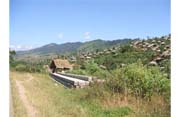|
Part II: Legislative Process
In all refugee camps along the Thai/Burma border areas, there is no governing Penal Code that is commonly practiced. Different criminal laws prevail in different camps and depending on their locations and geographical situations there are various levels of influences from non? state actors. Additionally the whims of the camp administrative committees, Thai local authorities and persuasion, pressure and intervention of international organizations has impacted significantly upon the legislative process within the camps. To make matters worse, there is no criminal procedural law that is applied within the existing camp courts resulting in the denial of procedural justice.
The lack of statutory laws, the overlapping of the legislative power of various camp authorities, vagueness of effective laws, denial of participation of refugee people in producing these effective rules and regulations and an ignorance of basic criminal procedural law within the camps has created an environment where there is ambiguity, inconsistency and interference in the legislative process. These incidents are detailed below.
II. A. Overlapping of Legislative Powers -
The legislative processes that are in place within the Karen refugee camps are a product of collaboration between two Karen Organizations: The Karen Refugee Committee (KRC) and the Karen Elders Advisory Board (KEAB) now known as the Karen Education Committee (KEC). The KRC acts as both a legislature and an executive within the camp. It makes policy and helps to carry out these policy goals. While the KNU does not play an active role in the legislative process within the camps, the KRC sometimes will use KNU laws within the camp context creating issues of consistency and impartiality. Due to lack of formal legislative   processes of the refugee camps, within the two Karenni camps the effective criminal laws and procedures are the same as the rules, regulations and criminal codes exercised by the Karenni Government in its Karenni land. The Judicial Committees within each camp must refer to these codes and administer justice accordingly. These rules and regulations are supposed to provide the guidelines that residents must adhere to when living in the camps. On top of these regulations are the specific regulations of the Thai authorities. The Thai authorities have not established any statutory laws within the camp; rather they have protocols that the residents must abide by whilst living in the camps. The problem with these protocols is that they are not expressed in any written form, but rather conveyed verbally to residents in all camps, over loudspeaker in the mornings. processes of the refugee camps, within the two Karenni camps the effective criminal laws and procedures are the same as the rules, regulations and criminal codes exercised by the Karenni Government in its Karenni land. The Judicial Committees within each camp must refer to these codes and administer justice accordingly. These rules and regulations are supposed to provide the guidelines that residents must adhere to when living in the camps. On top of these regulations are the specific regulations of the Thai authorities. The Thai authorities have not established any statutory laws within the camp; rather they have protocols that the residents must abide by whilst living in the camps. The problem with these protocols is that they are not expressed in any written form, but rather conveyed verbally to residents in all camps, over loudspeaker in the mornings.
II. B. Ambiguity of Prevailing Laws and Vagueness of Effective Laws
While a great majority of refugee people do not have any accurate knowledge of prevailing criminal laws in the camps, camp authorities use rules and regulations, as effective laws, as they think fit, or in line with the guidance that they receive from internal or external sources. Ambiguity of prevailing criminal laws poses a critical problem in the camps for two reasons. First, authorities never publish the whole sets of criminal laws; and, second, these laws are never publicized formally.
The KRC and KEC have drafted a set of rules and regulations along with the relevant penalties for breaches of these rules, which are displayed within the camps9. They can be regarded as effective laws in which flaws are obvious.
II. C. Exercise of Dual or Triple Powers
The formation, function and responsibilities of KRC are not publicly known. The KRC might be created by the local people's organizations to deal with the international community and to facilitate the existence and administration of the camps along with the welfare of the camp residents. The major question labeled towards the KRC is whether or not it has been exercising dual or triple powers. The KRC can be identified as a semi-legislative body as all Karen refugee camps are obliged to comply with the rules and regulations issued by it. It can also be understood as an executive body given it receives some types of material support from the international community and is charged with distributing this support within the camps. It also supervises the administration of inferior camp committees and in some cases has adjudicated some significant criminal cases as an appellate court.
Although the KRC was able to contribute to the Karen refugee people in earlier periods, it now needs to be reformed as it has become institutionally defunct. Two factors are responsible for this. Firstly the formation of the KRC, which was made up of elected representatives on the basis of regular elections, no longer exist. Secondly, some qualified leaders appointed by local people's organizations have now left KRC under the UNHCR's resettlement program.10 In a seminar entitled "Women at Risk" conducted by UNHCR at Mae La refugee camp, Raw San Phoe, a leading member of the KRC, admitted that KRC needs to be reformed, however leaders are finding it difficult to find the time and resources to implement such reforms.11
II. D. Punishment is not proportionate to crime committed -
The level of punishment meted out to convicted criminals is not always proportionate to the crime committed. In one such instance a perpetrator was fined 2,000 baht for raping his victim. After sentencing the convicted man joked that had he known he was going to get such a small fine he would have happily paid 6,000 baht for the same offence. This type of fine has a number of negative consequences for the overall security situation within the camp. Firstly it does not act as any meaningful deterrent to would-be criminals or those who have committed crimes before. Knowing that the most likely outcome is a small fine, criminals are given very little disincentive to break the law. Secondly it places convicted criminals back into the camp system without any meaningful rehabilitation time served with the distinct possibility that they will violate the law again. Having criminals, convicted of serious crimes, living within the camp environment days after they have committed their crime, does not establish a healthy and secure environment in which residents must live. Finally, handing down such disproportionate punishments gives victims of crime the impression that there are no appropriate justice mechanisms within the camp. Such an environment breeds apathy and general discontent amongst camp residents towards the justice process. Without an engaged community with a positive view of its justice system, officials find it ever increasingly difficult to maintain some semblance of structure within the camp justice system12.
II. E. Legal knowledge of legislative bodies -
Questions abound as to the legal knowledge of the law enforcement bodies and indeed the knowledge of the residents. Officials elected to administer justice are more often than not respected or popular members of their communities, rather than experienced legal practitioners13. With no formal training or knowledge in law, the passing of judgment comes down to the individual interpretation of the presiding official. This has created an environment in which precedent is not established and with radically alternative judgments being handed down from one case to the next.
In Noh Poe camp a step-father was found guilty of raping his 14 year old step-daughter after it was revealed she was pregnant with his child. The camp judiciary found him guilty of this offence and fined him 5,000 baht, to be paid to his victim. In another incident within Noh Poe a victim was molested by her friend after returning from a night out. The defendant was found guilty by the same camp judiciary as the aforementioned case, fined 10,000 baht and served 42 days in detention prior to his trial14. While not condoning the actions of either perpetrator, this highlights the ambiguity and inconsistency in which sentences are handed down. One crime is abhorrent, that of pedophilia and rape, yet the accused received a lighter sentence than a person convicted of molestation. Victims in these instances are often left bewildered and frustrated at the lack of adequate justice. They have little recourse to appeal the decisions and perpetrators are left to offend again
|
Footnotes
9. Refer to Appendix 37 for a full list of rules, regulations and penalties imposed.
10. Interview with Nang Myint Myint Aye, a former camp committee member,
and Daw Nge, a former election committee member, from the Noe Poh refugee
camp.
11. Interview with Daw Nge, a former election committee member from Noe
Phoe camp, who attended UNHCR seminar on “Women at Risk”.
12. This is a serious issue and will be elaborated upon in more depth within the
judicial analysis.
13. For full details of procedures and election of officials refer to Annex (B).
14. For full details of both cases refer to appendixes 14 & 15.
|


 processes of the refugee camps, within the two Karenni camps the effective criminal laws and procedures are the same as the rules, regulations and criminal codes exercised by the Karenni Government in its Karenni land. The Judicial Committees within each camp must refer to these codes and administer justice accordingly. These rules and regulations are supposed to provide the guidelines that residents must adhere to when living in the camps. On top of these regulations are the specific regulations of the Thai authorities. The Thai authorities have not established any statutory laws within the camp; rather they have protocols that the residents must abide by whilst living in the camps. The problem with these protocols is that they are not expressed in any written form, but rather conveyed verbally to residents in all camps, over loudspeaker in the mornings.
processes of the refugee camps, within the two Karenni camps the effective criminal laws and procedures are the same as the rules, regulations and criminal codes exercised by the Karenni Government in its Karenni land. The Judicial Committees within each camp must refer to these codes and administer justice accordingly. These rules and regulations are supposed to provide the guidelines that residents must adhere to when living in the camps. On top of these regulations are the specific regulations of the Thai authorities. The Thai authorities have not established any statutory laws within the camp; rather they have protocols that the residents must abide by whilst living in the camps. The problem with these protocols is that they are not expressed in any written form, but rather conveyed verbally to residents in all camps, over loudspeaker in the mornings.